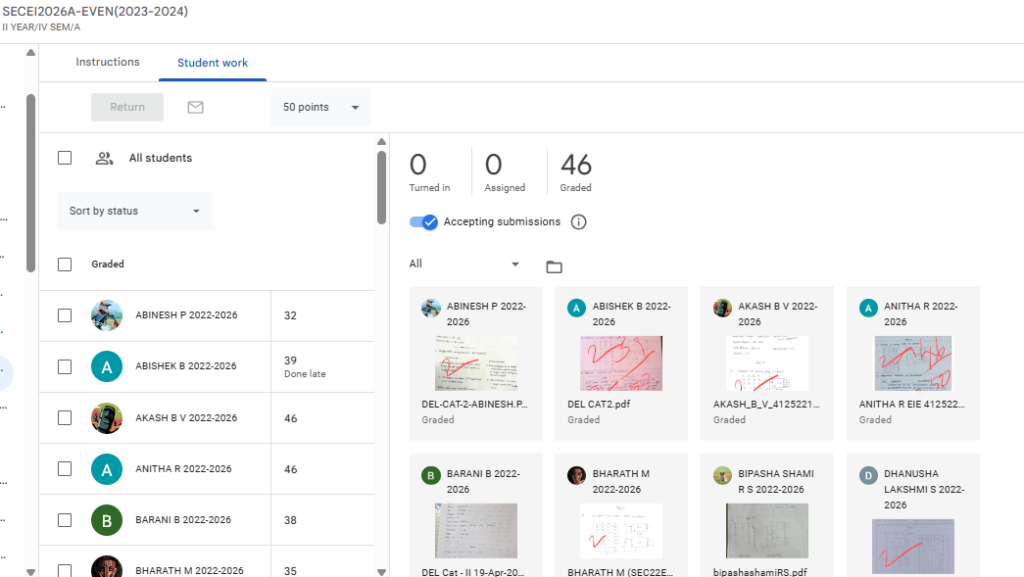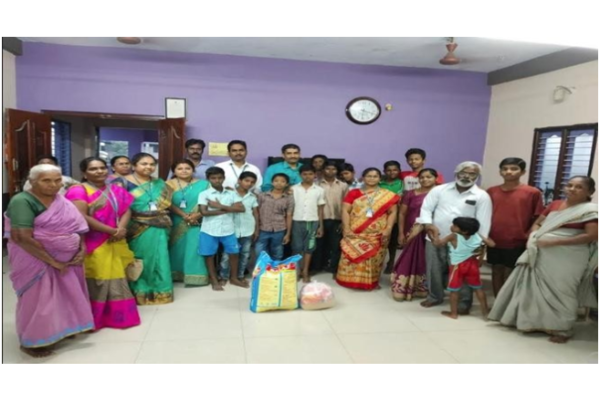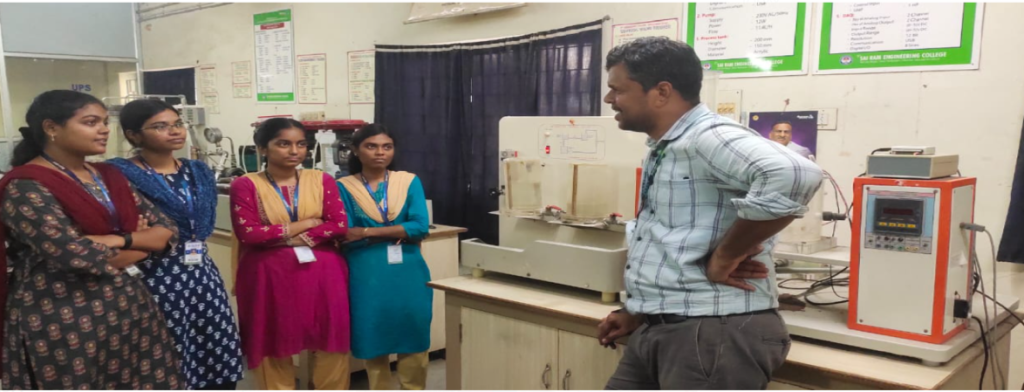The Department employs a diverse range of instructional methods and pedagogical initiatives to enhance student learning and professional development.
Staff handling similar subjects are assigned as Content creators out of which one faculty from each department is assigned as a Course coordinator and as a Course Moderator for monitoring the content, and setting of question papers for CATs by properly verifying the course outcomes along with Bloom’s level of taxonomy. A snapshot of the e content posted in the Google classroom is shown in the figure below.
A Google Classroom is created for every section in the I, II, III, and IV years. All the staff members who are handling the subject are enrolled as teachers along with the Head of the Department, Dean(Academics), and Principal for efficient monitoring. The students of the corresponding class are given an invite by the class coordinator and it is ensured that the students as well as subject staff have joined the Google Classroom. The e-content created for the individual subjects is posted as materials for the students along with recent trends in the particular subject in the form of videos. They also upload course plans, eBooks, course materials, video lectures, question banks, etc. It helps the students to come prepared for the class. The tools in the Google Classroom facilitate online assessment of students, which can be used to measure the outcomes of each course. Quiz assignments are also posted for the students in the classroom and monitored regularly.
The exclusive AI-powered platform of Sairam Institutions, to evaluate the students’ higher-order thinking level, using three types of assessment methodologies, namely Subjective Assessment, Objective Assessment and Coding Assessments. These components will be evaluated for CO attainment as a direct assessment tool.The Institution is a wi-fi-enabled campus that provides an e-learning atmosphere for the faculty and students to discuss the objective assignments provided over Google forms and also through a dedicated ICT tool like SAIL App.
The details of SAIL Analytics are shown as



The curriculum is framed with inputs and suggestions from various subject experts to provide experiential and participative learning. Student-centric learning is nurtured by providing an ICT-enabled campus and IP-enabled library facility which provides a platform for students to develop their contemporary skills and ethics to shape their behavior. Faculty employ teaching pedagogical techniques like Lectures with demonstrations in laboratories, models/charts animation, Industrial visits, Simulation-based training Collaborative learning and Brainstorming.



Students are given exposure to the world of simulation by enhancing their skills through Skill enhancement programs and workshops. Hands-on sessions on IoT and Robotics were conducted for Second-year students along with Data Science using R programming. Second-year students were offered a one-credit course on R programming to equip themselves with the latest developments happening around the world.

For third-year and final-year students, workshops on the Design of Controllers for electrical and process control applications using MATLAB for enhancing their simulation knowledge in control systems by our faculty Dr.S.Durga Devi, Ms.K.Thirupura Sundari and Ms.B.Puviyarasi. The students were able to perform simulation analysis for a given system and methods to implement a fuzzy logic controller were also demonstrated.

One-week hands-on workshop was conducted for final years on Advanced Industrial Automation using PLC. They were also equipped with an awareness program to get themselves prepared for Technical recruitment.
To improve the communication skills of the students, Group tasks were assigned to them by participating in Group discussions and Case analysis. A student demonstrating a case and involvement of students in a group discussion are shown in the picture.
Workshop and guest lectures introduce new concepts, spurring participants to investigate it further on their own, or demonstrate and encourage the practice of actual methods. It’s a great way to teach hands-on skills because it offers participants a chance to try out new methods and fail in a safe situation.The list of workshop and guest lectures organised has been shown in the table which is as follows.
| S.No | Name of the Professional Societies/Bodies/Chapters/ Clubs | Name of the Event | National/ International level | Date of Event |
|---|---|---|---|---|
| 1 | IEEE | Outreach program on sustainable development goals synergistic social support for schools | National | 18.4.2024 |
| 2 | IEEE | Two days boot camp series – IoT innovators crafting solutions for tomorrow | National | 22.3.2024 & 24.3.2024 |
| 3 | IEEE | IEEE Foundation day | National | 16.2.2024 |
| 4 | IEEE | International Conference On Intelligent Computing And Control For Engineering And Business Systems ( Iccebs 2023) | International | 14.12.2023 &15.12.2023 |
| 5 | IEEE | Win GATE 2024 - Expert Tips and Tricks | National | 30.09.2023 |
| 6 | IEEE | IEEE Mega Membership drive and Awareness Program | National | 28.09.2023 |
| 7 | IEEE | Guest Lecture On Xr Technologies | National | 27.09.2023 |
| 8 | IEEE | IEEE membership drive for professionals | National | 8.8.2023 |
| S.No | Name of the Professional Societies/Bodies/Chapters/ Clubs | Name of the Event | National/ International level | Date of Event |
|---|---|---|---|---|
| 1 | IEEE | IEEE Membership Drive And Awareness | National | 26.5.2023 |
| 2 | IEEE | IEEE Sponsored Training for Industry Professionals | National | 24.5.2023 |
| 3 | IEEE | 5 Days Hands On Training Workshop On Iot And Robotics In Collaboration With Kite | National | 20.3.2023 to 25.3.2023 |
| 4 | IEEE | Report Of The Webinar On Vision Control System Based On Image Analysis | National | 30.11.2022 |
| 5 | IEEE | Essential Preparation Strategies for Technical Recruitment Process | National | 22.9.2022 |
| 6 | IEEE | Guest Lecture On How Engineering Can Be Done | National | 25.8.2022 |
| 7 | ISOI | 2 Days Workshop On Design Of Controllers For Electrical & Process Control Applications Using Matlab | National | 19.09.2 to 20.09.22 |
| 8 | ISTE | Skillrack Awareness Program For Ii Years | National | 18.10.22 |
| S.No | Name of the Professional Societies/Bodies/Chapters/ Clubs | Name of the Event | National/ International level | Date of Event |
|---|---|---|---|---|
| 1 | IEEE | IEEE CS Society Presenting Matlab Simulink | National | 31.5.2022 |
| 2 | IEEE | IEEE Sponsored Webinar On Prospects Of Automotive Sector And Tips To Pursue Higher Studies Germany | National | 7.5.2022 |
| 3 | IEEE | Levelling The Career For Instrumentation Engineers | National | 22.11.2021 |
| 4 | IEEE | Virtual Hands On Demo Innovative Projects-A Glimpse | National | 25.9.2021 |
| 5 | IEEE | IEEE Sponsored Hands On Training On “ Industry 4.0 – A Transformation In Industrial Automation” | National | 18.9.2021 |
| 6 | IEEE | Disquisition Talk On Entrepreneurship And Its Future For Eie Engineers | National | 8.9.2021 |
| 7 | IEEE | Rhapsodize talk on Overseas Education and Career Opportunities for Master’s Degree. | National | 4.9.2021 |
| 8 | IEEE | Hands on training on "Data Science using R programming" | National | 24.8.2021 |
| 9 | IEEE | Panel discussion on Next-Gen Technology | National | 7.8.2021 |
| 10 | IEEE | Recent Trends In Artificial Intelligence | National | 5.8.2021 |
| 11 | ISTE | Guest Lecture On How Engineering Can Change Your Life | National | 15.9.2021 |
| 12 | ISTE | Five Days Virtual Faculty Development Programme (Fdp) On Bio-Inspired Learning | National | 20.12.2021 to 24.12.2021 |


Co-curricular and extracurricular activities are conducted to motivate the students and to improve their problem-solving capabilities, leadership abilities, multi-disciplinary skills, teamwork and create awareness of professional ethics and critical reasoning abilities. These activities include Webinars, Aptitude Training, Social Awareness & Community Development Programs, Entrepreneurship Development Programs, Critical Thinking, etc.
Case Studies in Teaching Process
As part of the Process Control curriculum in the V Semester, students study the topic “Boiler Drum Level Control” in Unit 5. Since theoretical knowledge alone may not be sufficient to understand real-world applications, an industrial visit to Arasu Cement Factory, Ariyalur, was organized. This visit provided students with practical exposure to process control techniques used in large-scale industrial operations.
Objective of the Case Study
During the visit, students observed the boiler drum level control system in action. The key takeaways included:
1. Boiler Function in Cement Industry: The boiler is used to generate steam, which is essential for various heating and processing applications in cement production.
2. Drum Level Control Mechanism: The Three-Element Control System was explained, where:
3. Importance of Level Control: Maintaining the correct water level is crucial to avoid boiler damage, steam quality issues, and operational inefficiencies.
4. Automation & Instrumentation: The factory uses PID controllers and Distributed Control Systems (DCS) to maintain optimal boiler drum levels.
Analysis & Learning Outcomes
The industrial visit to Arasu Cement Factory significantly enhanced students’ understanding of Boiler Drum Level Control in a real-world scenario. By analyzing a live case study, students gained hands-on knowledge of process automation, control strategies, and the importance of precise level regulation in large-scale industries. This experience will be valuable for their VI Semester Process Control Lab and future careers in process industries.



The use of case studies and real-life examples in teaching refers to an educational approach where instructors incorporate real-world scenarios, problems, and experiences into their lessons. This method helps students understand theoretical concepts by applying them to practical situations.Real-life examples make learning more engaging and relatable, helping students see how concepts work outside the classroom.
In the III Year V Semester Process Control course, the topic “Interacting System” is covered in theory but is not included in the practical sessions of the V Semester. However, since the Process Control Lab is available only in the VI Semester, Dr. K. Anbumani has taken an innovative approach to bridge this gap by introducing real-life examples in a lab environment. To enhance students’ understanding, the faculty brought students to the Process Control Lab, where they could observe and analyze real-time process interactions. By demonstrating actual control loops, fluid flow systems, and industrial controllers, students were able to connect theoretical concepts with practical applications. This method not only improved students’ conceptual clarity but also provided early exposure to hands-on learning, preparing them for the VI Semester Lab. The integration of real-life examples in a lab setting helped students develop a deeper understanding of process dynamics, system behavior, and practical problem-solving skills, making the learning process more engaging and effective.
In today’s fast-paced technological world, platforms like SWAYAM, NPTEL, and MOOCs play a crucial role in enhancing the learning experience of engineering students. These online learning resources provide high-quality educational content from top institutions, allowing students to access courses on advanced topics beyond their regular curriculum. NPTEL (National Programme on Technology Enhanced Learning), a collaboration among India’s premier institutes like IITs and IISc, offers specialized engineering courses. SWAYAM is a government initiative that provides free online courses with certification opportunities. MOOCs (Massive Open Online Courses), offered by platforms like Coursera, edX, and Udemy, allow students to learn from global experts at their own pace. Additionally, self-learning through these platforms fosters independent thinking, problem-solving skills, and adaptability—qualities essential for engineers. By leveraging these resources, students can stay ahead in their careers, gain industry-relevant knowledge, and improve their employability.
List of NPTEL Courses taken by our students during the year 2023-2024
| S.No | Academic Year | Course Name | Number of Students Registered | Number of students Cleared | POs | PSOs |
|---|---|---|---|---|---|---|
| 1 | 2023-24 | Fuzzy Sets, Logic and Systems & Applications | 95 | 80 | PO-6,7,9 | PSO-2 |
| Project Management | 79 | 70 | PO-7,9 | PSO-2 | ||
| Patent Law For Engineers And Scientists | 94 | 62 | PO-6,9 | PSO-2 | ||
| Introduction To Industry 4.0 And Industrial Internet Of Things | 90 | 72 | PO-6,7 | PSO-2 |
List of MOOC Courses taken by our students during the year 2023-2024
| S.No | Academic Year | Course Name | Number of Students Certificate | POs | PSOs |
|---|---|---|---|---|---|
| 1 | 2023-24 | Coursera | 10 | PO-6,9 | PSO-2 |
| Spoken tutorial | 45 | PO-6,7 | PSO-2 | ||
| Udemy | 9 | PO-6,7,9 | PSO-2 | ||
| Learnathon | 40 | PO-6,7 | PSO-2 |

Skillrack Module
Students are continuously encouraged and monitored in enhancing their C, C++, JAVA, and Python programming skills through the SKILLRACK platform. Students can improve their programming techniques by solving the questions given in the virtual platform. Quantitative aptitude problems, and logical reasoning problems can also be solved apart from daily tests, and weekly tests scheduled.

The students and faculty are encouraged to self-learning activities by enrolling in courses in reputed online platforms. The registration and participation of students in MOOC Courses like NPTEL, Coursera, and GUVI are evidence of their self-learning capabilities. These courses enable them to enrich their subject knowledge, give exposure to recent technological advancements and also serve as a platform to strengthen their interdisciplinary skills. It is also considered as a key for lifelong learning . Provision is provided in the autonomous curriculum for the students to complete an online course from NPTEL-Swayam. The number of courses completed by the department faculty and students is illustrated in the table.
Self learning courses completed by our students
| S.NO | Online course platform | No of the courses completed by our students | ||
|---|---|---|---|---|
| 2022-23 | 2023-24 | 2024-25 | ||
| 1 | SpokenTutorial (IIT BOMBAY) | 189 | 225 | 252 |
| 2 | COURSERA | 15 | 25 | 10 |
| 3 | IBM | 20 | 22 | 12 |
| 4 | NPTEL | 44 | 202 | 265 |
| 5 | GUVI | 21 | 25 | 30 |
| 6 | IEEE/Linked In | 11 | 12 | 15 |
| 7 | UDEMY | 5 | 6 | 7 |
| 8 | NASSCOM FUTURE SKILLS | 2 | 4 | 5 |